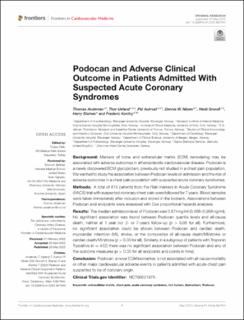Podocan and Adverse Clinical Outcome in Patients Admitted With Suspected Acute Coronary Syndromes
Andersen, Thomas; Ueland, Thor; Aukrust, Pål; Nilsen, Dennis W.T.; Grundt, Magnea Heidi Jonsdottir; Staines, Harry; Kontny, Frederic
Journal article, Peer reviewed
Published version

Åpne
Permanent lenke
https://hdl.handle.net/11250/3010280Utgivelsesdato
2022Metadata
Vis full innførselSamlinger
- Department of Clinical Medicine [2065]
- Registrations from Cristin [9766]
Sammendrag
Background: Markers of bone and extracellular matrix (ECM) remodeling may be associated with adverse outcomes in atherosclerotic cardiovascular disease. Podocan is a newly discovered ECM glycoprotein, previously not studied in a chest pain population. We wanted to study the association between Podocan levels on admission and the risk of adverse outcomes in a chest pain population with suspected acute coronary syndromes. Methods: A total of 815 patients from the Risk markers in Acute Coronary Syndrome (RACS) trial with suspected coronary chest pain were followed for 7 years. Blood samples were taken immediately after inclusion and stored in the biobank. Associations between Podocan and endpoints were assessed with Cox proportional hazards analyses. Results: The median admission level of Podocan was 0.674 ng/ml (0.566–0.908 ng/ml). No significant association was found between Podocan quartile levels and all-cause death, neither at 1 year nor 2- or 7-years follow-up (p > 0.05 for all). Furthermore, no significant association could be shown between Podocan and cardiac death, myocardial infarction (MI), stroke, or the composites of all-cause death/MI/stroke or cardiac death/MI/stroke (p > 0.05 for all). Similarly, in a subgroup of patients with Troponin T-positive (n = 432) there was no significant association between Podocan and any of the outcome measures (p > 0.05 for all endpoints and points in time). Conclusion: Podocan, a novel ECM biomarker, is not associated with all-cause mortality or other major cardiovascular adverse events in patients admitted with acute chest pain suspected to be of coronary origin.
